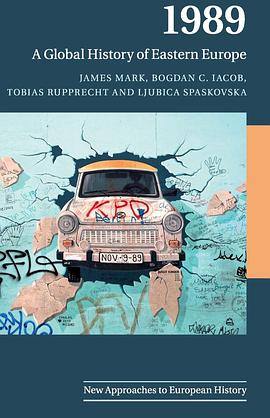1989
豆瓣
a global history of eastern europe
James Mark / Bogdan C. Iacob
简介
The collapse of the Berlin Wall has come to represent the entry of an
isolated region onto the global stage. On the contrary, this study argues
that Communist states had in fact long been shapers of an interconnecting
world, with 1989 instead marking a choice by local elites about the form
that globalisation should take. Published to coincide with the thirtieth
anniversary of the 1989 revolutions, this work draws on material from local
archives to international institutions to explore the place of Eastern Europe
in the emergence, since the 1970s, of a new world order that combined
neoliberal economics and liberal democracy with increasingly bordered
civilizational, racial, and religious identities. An original and wide-ranging
history, it explores the importance of the region’s links to the West, East
Asia, Africa, and Latin America in this global transformation, reclaiming
the era’s other visions such as socialist democracy and authoritarian modernization
that had been lost in triumphalist histories of market liberalism.
contents
Acknowledgements;
Introduction;
0.1 Going global;
0.2 The long transition and the making of transitional elites in global perspective;
0.3 A global history of the other '1989s';
0.4 The end of the '1989' era?;
1. Globalisation;
1.1 From socialist internationalism to capitalist globalisation;
1.2 Debt and ideological re-orientation;
1.3 The choice of 'neoliberal' globalisation;
1.4 Authoritarian transformations?;
1.5 Transformation from within;
1.6 Conclusion;
2. Democratisation;
2.1 Reforming elites;
2.2 Opposition from the local to the global and back;
2.3 Alternatives to '1989': authoritarianism and violence;
2.4 Disciplining transition and democratic peace;
3. Europeanisation;
3.1 The early Cold War: a divided Europe;
3.2 Helsinki - re-bordering Europe?;
3.3 An anti-colonial Europe: critiquing Helsinki;
3.4 A prehistory of Fortress Europe: civilisational bordering in late socialism;
3.5 Eastern Europe, a buffer against Islam?;
3.6 After 1989: 'Fortress Europe'?;
3.7 Conclusion;
4. Self-determination;
4.1 The rise of anti-colonial self-determination;
4.2 The Soviet withdrawal;
4.3 Peace or violence;
4.4 Reverberations of Eastern European self-determination;
4.5 Conclusion;
5. Reverberations;
5.1 1989 as a new global script;
5.2 Instrumentalising 1989: the West and new forms of political conditionality;
5.3 'Taming' the left;
5.4 Interventionism and the '1989' myth;
5.5 Eastern Europeans and the export of the revolutionary idea;
5.6 From Cuba to China: rejecting '1989';
5.7 Conclusion;
6. A world without '1989';
6.1 Towards the West? Ambiguous convergence;
6.2 Who is the true Europe? The turn to divergence;
6.3 Beyond the EU: post-socialist global trajectories;
6.4 Conclusion.